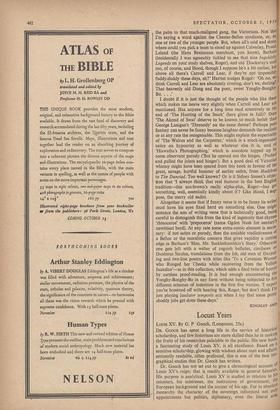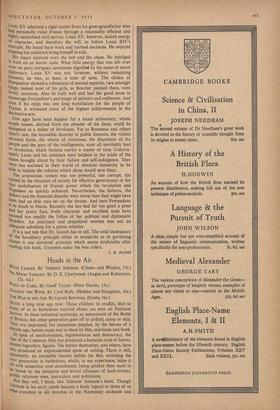Locust Years
Louis XV. By G. P Gooch. (Longmans, 25s.)
DR. Gooch has spent a long life in the service of historical scholarship, and few historians are more skilled than he in making the fruits of his researches palatable to the public. His new bonl‘' a fascinating study of Louis XV, is all excellence. Based on sensitive scholarship, glowing with wisdom about men and affairs, eminently readable, often profound, this is one of the best big' graphical studies that Dr. Gooch has written. Dr. Gooch has not set out to give a chronological account of Louis XV's reign; that is readily available in general historia' His purpose is analytical. Louis XV is studied in relation to 1111 ministers, his mistresses, the institutions of government, the European background and the temper of his age. For in absolute monarchy the character of the sovereign influenced not only appointments but politics, diplomacy, even the liberal arts. Louis XV inherited a rigid system from his great-grandfather who had personally ruled France through a reasonably efficient and highly centralised civil service. Louis XV, however, lacked energy of character, and therefore the will, to follow Louis XIV's example. He hated hard work and loathed decisions. He enjoyed reigning but could not bring himself to rule.
His major interests were the bed and the chase. He indulged in both on an heroic scale. What little energy that was left over went on petty intrigues, sometimes dignified by the name of secret diplomacy. Louis XV was not, however, without redeeming features; he was, at least, a man of taste. The choice of longs; showed a refinement of sensual appetite, rare amongst Kings; indeed most of his girls, as Boucher painted them, were lovely creatures. Also he built well and had the good sense to encourage Pompadour's patronage of painters and craftsmen. And even if his reign was one long humiliation for the people of France, it witnessed some of the highest achievements in the decorative arts.
Few ages have been happier for a locust aristocracy, whose ample means, derived from the plunder of the State, could be dissipated in a welter of loveliness. Yet as Rousseau and others clearly saw, the incredible disorder in public finances, the violent Personal feuds, the whims of mistresses, the discontent of the People and the jeers of the intelligentsia, must all inevitably lead to revolution, which became merely a matter of time. Unfortu- nately Louis and his ministers were helpless in the midst of the chaos brought about by their failure and self-indulgence. They were too enclosed in their world of absolute monarchy to be able to initiate the reforms which alone would save them.
The aristocratic system was too powerful, too corrupt, too rooted in the structure of society for effective government or for that mobilisation of French power which the revolution and Napoleon so quickly achieved. Nevertheless, the failures, the defeats and the financial disorder were worse than they might have b. een had an able man sat on the throne. And here Pompadour Is as much to blame. Recently she has had far too good a press and her pretty face, lively character and excellent taste have excused too readily the follies of her political and diplomatic blunders. An untrained and prejudiced woman was not an adequate substitute for a prime minister. It is a sad tale that Dr. Gooch has to tell. The total inadequacy of the hereditary principle either in monarchs or in governing classes is one universal principle which seems irrefutable after reading this book. Usurpers make the best rulers.
J. H. PLUMB



















































 Previous page
Previous page